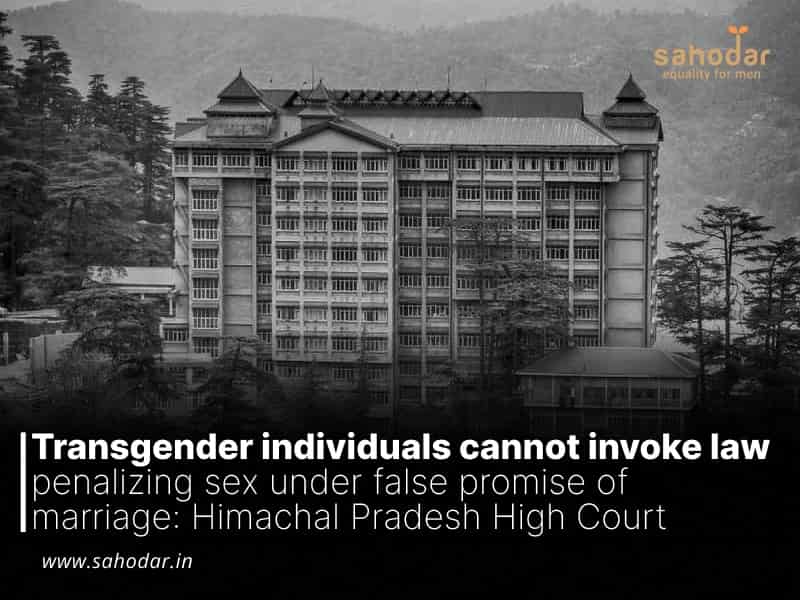It, therefore, granted bail to a man accused of establishing sexual relationship with a transgender person on the false promise of marriage.
The Himachal Pradesh High Court recently decided in Bhupesh Thakur vs. State of Himachal Pradesh that Section 69 of the Bharatiya Nyaya Sanhita (BNS), which punishes sex based on a false promise of marriage, can only be used if the complainant is a woman, not a transgender person.
The court granted bail to a man accused of having a sexual relationship with a transgender person under the false promise of marriage.
The man was charged under Section 69 (sexual intercourse with a woman by deceitful means) of the Bharatiya Nyaya Sanhita (BNS) and Section 18(d) of the Transgender Persons (Protection of Rights) Act, 2019.
Justice Sandeep Sharma noted that since the term ‘transgender’ has now been distinctly defined under the definition of ‘gender,’ transgender individuals cannot identify as either male or female, as they are recognized with a separate identity.
The Court also reviewed Section 69 of the BNS and determined that this law can only be applied if the complainant is a woman.
“In aforesaid provision of law, it has been categorically provided that whoever by deceitful means or by making promise to marry to a woman without any intention of fulfilling the same, has sexual intercourse with her, such sexual intercourse not amounting to the offence of rape, shall be punished with imprisonment of either description for a term, which may extend to ten years and shall also be also liable to pay fine.”
In this case, the Court noted from the victim’s statements that she had acknowledged being transgender. Therefore, it agreed with the accused’s lawyer’s argument that no case under Section 69 could be established against him.
“Since under BNS, “woman” and “transgender” have been given different identity and have been defined independently, under Section 2 coupled with the fact that physical relationship inter-se victim-prosecutrix and bail petitioner, if any, was developed prior to surgery of victim-prosecutrix, whereby she allegedly got her sex changed, there appears to be force in the claim of the bail petitioner that he could not have been booked under Section 69 of the BNS”.
The Court further stated that the accused should be prosecuted under Section 18(d) of the Transgender Persons (Protection of Rights) Act, 2019, which mandates a prison sentence of six months to two years for those who physically or sexually abuse transgender individuals.
The man was charged on July 18 following a complaint that during the COVID-19 lockdown, he had connected with the victim through Facebook, and they had remained in contact since then.
The transgender person claimed that despite knowing her gender, the man insisted on marrying her. She also alleged that his parents, while unwilling to approve the marriage, suggested she undergo gender reassignment surgery.
She claimed that even after undergoing gender reassignment surgery, the accused refused to marry her and has since arranged to marry someone else.
Last month, the Court granted interim bail to the accused. In addition to arguing that he could not be charged under Section 69 of the BNS, his lawyer also noted that the claim about the sex change had not been verified because the victim had refused a medical examination.
Justice Sharma stated that the accused had already cooperated with the investigation and that there was nothing more to recover from him.
While acknowledging that the accused could not be charged under Section 69 of the BNS, the Court also observed that there was no evidence suggesting he attempted to have a physical relationship with the victim after the alleged surgery.
“Though case at hand shall be decided by the court below in the totality of evidence collected on record by the prosecution, but keeping in view the aforesaid glaring aspect of the matter, there appears to be no justification for this court to send the bail petitioner in judicial custody, especially when nothing remains to be recovered from him,” the Court said.
The Court thus granted bail to the accused.

